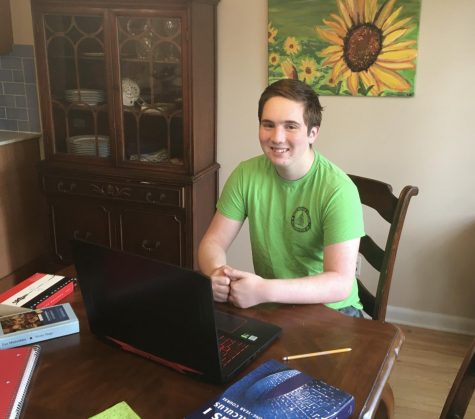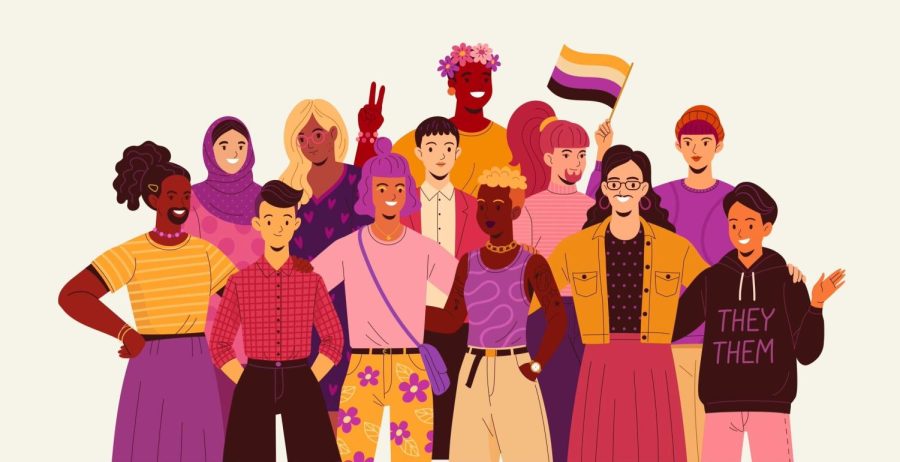My Journey as a Non-Binary Person
Exploring gender identity can be a difficult journey
This narrative is the first edition in a trilogy for Eastside Online called “My Journey,” telling the story of an impactful year in the life of incoming Editor-in-Chief Aiden Rood (‘23.)
“Hi.”
“My name is Aiden.”
“My pronouns are they/them.”
If you’ve ever met me, the true and fullest version of me, that’s how I introduced myself. The first two lines are nothing unexpected; the third is a life-changing part of who I am.
I am a proud, open non-binary person. Many people won’t care about anything other than that, immediately condemning me upon learning of my identity. That’s the reality in a world where less than half of LGBTQ+ people feel comfortable sharing their identities with even those closest to them.
But, if you’ve read this far, it is my hope that you are of a more open-minded perspective — that you see me as just another person. Because that’s who I am: not a man, nor a woman, but just a person.
It took me years to figure that out. It caused me a lot of sleepless nights. It wasn’t easy. But eventually, I did figure it out. And now, living as the most complete version of who I am, I am so much happier for it.
Now, you may be thinking “Okay, great. Good for you. But why are you telling us all of this? Why should I keep reading?”
Well, I’m not the only person with these experiences. Not in our community, not in our school, and most likely not in your own personal life, even if you don’t know it yet.
When LGBTQ+ people talk about their experiences, we are often met with, if not outright prejudice, a sense of dismissal. Why, many wonder, should I care about how someone identifies or who they love? And in a perfect world, we would be right not to care. But the reality is, right now, and probably for a long time, we have to care. We have to care because in a world full of discrmination and misunderstandings, the LGBTQ+ people around us — people like me — are counting on those who do understand, and who are willing to try. So by seeking to learn and recognize the experiences of LGBTQ+ people in our community, you can do your part to provide that understanding and support.
So, why am I happier? Why does it matter that I realized I’m non-binary, and that I could start expressing myself to match? I’d love to tell you.
When I was growing up, people would often make comments that, while ignored by others, would make me a bit uncomfortable.
“You’re such growing boys,” someone would say as a friend and I chomped down on huge slices of watermelon in the summer heat.
“You’ll look so handsome in a suit,” I’d hear as a formal dance approached.
And the list goes on. While these comments lacked any harmful intent, they did make assumptions — and assumptions can often make their subjects uncomfortable. What if I was just eating watermelon because I was hungry, not because of anything to do with my gender? What if, just maybe, I wanted to wear a dress to that dance. Were those things impossible, just because I was a boy — something I never chose to be?
These experiences, while difficult at times, helped lead me towards the realization that I was not a “boy” or a “man.” When thinking more about the subject, I further realized that “girl” or “woman” were not a perfect fit, either. So where did that leave me? It took some time to figure out, but eventually, I realized: I am non-binary.
Once a person realizes that they identify as a different gender than they were assigned, there is no playbook to follow — no clear next steps. For some people, that could be it, and that’s okay! Everyone chooses to express their gender in different ways. For me, I started by coming out to my closest friend, then my parents, and then all of the people around me. From there, I bought some new clothes, got my ears pierced and hair cut, and started presenting myself in a way that felt more “me.”
I also began to use they/them pronouns. These little words, which may seem insignificant, can really have a big impact; they do for me. Being called “he” or referred to as “him” reminds me of an identity that doesn’t feel right. With she/her not being quite right either, going by they/them is what works best for me and many other non-binary people.
The second I started expressing myself in these ways, I felt more confident, more proud; I was happier. Research shows that I’m not alone in those feelings, either: significantly fewer transgender and non-binary kids have been found to struggle with their mental health when they are able to freely express their gender identities.
The “meaning of life” is a concept that many people throughout our history have sought to define. And if I had the definite answer, I’d be a very wealthy person. But, I’ll take a stab at it: to me, life is about finding where you belong. We live in a huge world where there are more people and places than we can truly even comprehend. So, in a world so big, we have to find something smaller, something more personal. We have to find where we belong, where we feel valued. And to find the place where we really belong, we first must figure out who we really are.
Being non-binary isn’t easy. People don’t always understand. They’re not always kind. But, I wouldn’t change a thing. Because this is who I am, and knowing that helps me find a beautiful sense of meaning in this crazy life.
Discovering my identity changed my life. Now, if we can just come together, work to learn about and understand each other, and discover acceptance for all? That would change the world.

Elle Rood is a sophomore and Eastside Global Commentary Editor. Outside the (virtual) newsroom he can be found staffing national political campaigns, collecting...


Myke • Feb 4, 2023 at 8:07 pm
I’ve just come to settle with the acceptance that I’m non-binary… and it feels so good to rest in it. I’m 40 years old and feel there are parts of me that I get to finally express. And you articulated my exact thought about our journey in life – to find a place that can feel like home as opposed to being estranged.
Gratitude for this article… I needed to read this. Sending love to all those out there striving to be a little bit more authentic without feeling shame in doing it.
Abby • Jun 16, 2022 at 10:31 pm
Thank you for telling your story and being so open, Aiden. You inspire me and those around you every single day. I love you beyond words❤️